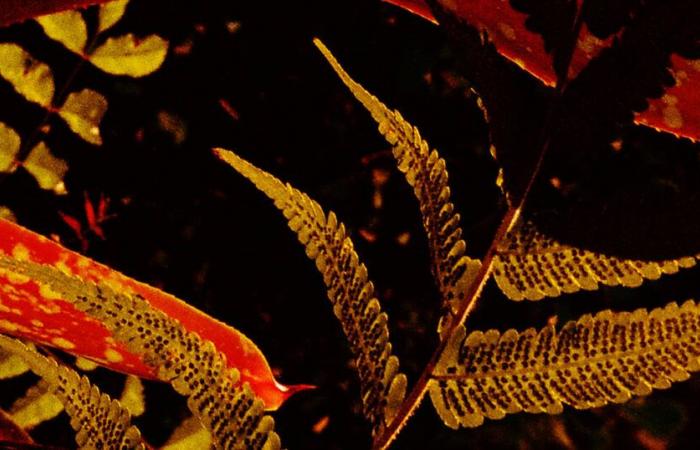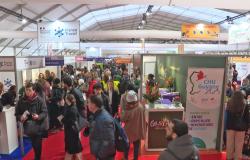
Our house is burning and, truth be told, all the cameras are focused on the fire but not much changes. From distraught polar bears on their ice floes to megafires spewing black plumes, including floods carrying car wrecks, images of disasters populate television news as much as contemporary art biennials. So much so that we may end up wondering if knowing what awaits us will be enough to avoid it. This is, in essence, the question posed by the Pompidou Center and the French Office for Biodiversity (OFB) on the occasion of the Biodiversity forum: which culture for which future?, from November 20 to 24 in Paris, and of which Liberation is a partner.
The lever that may seem the most obvious for initiating change is the one that makes it possible to clearly identify those who have every interest in continuing the business. «as usual», as per usual. The journalist Nicolas Legendre traveled the roads of Brittany for several years in order to identify the different links of the agri-food system which he methodically exposed in Silence in the fields (Artaud, 2023). With this book – awarded the Albert-Londres prize, the most prestigious in French journalism – Legendre (who will be present at the forum) recounts the omnipresence of the agro-industrial sector in decision-making bodies, the constraint economic impact that it places on small producers and the pressure it imposes on those who denounce intensive agricultural practices, responsible, among other things, for the tides of green algae which intensify every summer on the coasts Breton. “For several years, we have seen a counter-offensive from the agri-food industry, which had been particularly attacked over the use of GMOs or pesticides such as glyphosate.warns Nicolas Legendre. Its members returned with new strategies, communicating on “agribashing”, benefiting from a particularly lenient Ministry of Agriculture under Emmanuel Macron, torpedoing the initiative “Farm to Fork” [“De la ferme à la table”, ndlr] at the European level…” Legendre’s investigation, carried out over several years across the high points of Breton agriculture, unfolds a relentless argument on the pressure exerted at all levels, from the fields to the ministries, by the big names in agriculture. However, a year after receiving his prize and touring the media and bookstores, “nothing has changedsighs the journalist. From a regulatory point of view, at least, nothing has changed. There has certainly been an impact on public opinion, but it is quite weak.
Facts and emotions
For Nicolas Legendre, if scrupulous journalistic work clearly identifying the obstacles that prevent an agroecological transition is not enough, it is partly because“we do not bite the hand that feeds us: where it is easy to criticize Totalbecause it is an industry that we readily imagine dirty, with its oil drilling and its smoking chimneys, it is something else to attack the farmers, who put food on our plate and are made into symbols of French identity”.
History is, however, punctuated with texts which seem to have succeeded in changing its course: In the penal colonyby Albert Londres, who recounted, in 1923, the daily life of convicts in the Cayenne penal colony and caused such a stir that the public authorities suspended sending prisoners to Guyana; Or Silent spring, by Rachel Carson, who, in 1962, played a key role in the banning of DDT in the United States. But these two texts present a quality that goes beyond the simple journalistic register, often adopting a lyrical tone and playing on both the register of facts and that of emotions, observes Nicolas Legendre: “We are arriving at a moment when journalism must succeed in inventing new forms, which intertwine with fiction, to deeply touch the reader.”
Affects are also what CNRS film director Momoko Seto aims for, who will present her film at the forum Planet Sigma (2014) (see also page V). With this short film (11 minutes) which tells, at insect level, the accelerated warming of a planet, Momoko Seto was keen to “to magnify this world, that is to say both magnify it, but above all make it magnificent”. To do this, she spent hours sculpting light on a dung beetle to make it “class”convinced that “showing in cinema what we reject can create empathy”. Because, for the Franco-Japanese, this is the type of ecological film adapted to our times: not a documentary with grandiloquent violins and honeyed Netflix-style voice-overs, but a fiction film whose protagonists are insects, or even, for his next feature film, dandelion seeds in search of new soil.
Because once those responsible are pointed out (eventually, we begin to know them…), cultural productions also have a role to play in the new relationship with the world that we can oppose to them – and this could well pass. through new attachments and a new empathy for all living things around us. This is, for example, what is proposed by the gesture of the philosopher Baptiste Morizot, who will speak at Pompidou to present the book he has just signed with the artist Suzanne Husky, Return water to the earth. Alliance in the rivers in the face of climate chaos (Actes Sud, 2024).
Already in 2020, in his essay Ways of being alive (Actes Sud), the philosopher proposed to reverse the classic analysis: we are not going through a biodiversity crisis – which implies that the living world is collapsing before our alarmed gaze –, but, rather, we are experiencing a “crisis of sensitivity”that is to say that our indifference towards the living world and our inability to give it the consideration it deserves leads us to make societal choices responsible for its decline. In Return water to the earthMorizot and Husky choose an emissary to carry this message: the beaver.
Beaver Engineering
For a philosopher who began building his reputation as a wolf tracker, falling back on a rodent might feel like relegation. Far from it: the beaver, Morizot and Husky explain, is an outstanding engineer who, thanks to the dams he builds everywhere along waterways, has shaped the territory for millions of years. His buildings “low-tech engineer”which slow down the flow of rivers and therefore the water cycle, could well be a clever solution to this water crisis, both to hydrate environments in anticipation of periods of drought and to prevent flooding after episodes. Cévennes, for example.
By inviting us to look at the beaver, Morizot and Husky ask a question that could well be the basis of a culture to reinvent for the future: how can we give room to forces other than ourselves to shape our environment? What this question changes is that «the living no longer falls within the domain of “nature”he enters the field of politicsBaptiste Morizot explained to us in 2023. We must therefore find ways to establish political relations with him. But the problem is that since the 18th century, our modes of political relations have stabilized around a “citizenist” model, where the use of reasoned and rational speech takes precedence. This model cannot accommodate beavers, wolves and forests. We have to find something else. And this is not a question of “democracy with dogs” nor of giving legal personality to rivers.”
Behind the highlighting of beaver dams, the big project is to try to adopt other principles of land use planning which leave a fair place for other living things. Suzanne Husky spent long hours, feet in the mud, watercolor notebook in hand, in the great American plains to observe how the pioneers of regenerative hydrology (re)constructed wooden dams in s inspired by the engineering of beavers, and she was able to observe how they transform a landscape in the space of a few weeks, returning water to an environment that was almost devoid of it. Baptiste Morizot was inspired to build a similar work in the Drôme, and it is not uncommon to meet him there after a heavy rain, ecstatic, getting excited about the return of a “ghost river” or on the “living forces” that we see at work.
This work of the artist and the philosopher wading through the meanders of a watercourse then leads to very concrete reflections: the questioning of urban sprawl in flood-prone areas, the rehabilitation of thresholds to preserve continuity fish farming, management of the water cycle in the broad sense. “Investigating our relationships with the rest of life is absolutely not the prerogative of researchers, it would be a dramatic confiscation, Morizot explains to us again. Since the appearance of Sapiens, all forms of human life have investigated living things. For me, what is decisive is what foresters, farmers, people who restore rivers, amateur naturalists, agro-ecologists do… Today, peasant philosophy on the circuit short offers opportunities to enter into a relationship with an ecological environment.”
One of the pieces that could be missing to bring beavers and others into our society fully is, precisely, the law. This is what the lawyer Marine Calmet says in a book of interviews with Marin Schaffner, Decolonizing the law (Wildproject, 2024), which she will also present during the forum. After realizing that “most of them” firms specializing in environmental law for which she has worked “were in fact defending oil companies or large companies in the construction sector», the lawyer embarked for Guyana in the company of an indigenous delegation supported in particular by lawyers. From this experience, she then co-founded the Wild Legal program, driven by a question: what society are we building with the law? Marine Calmet explains: “In legal fiction, the question in reality is not so much “what law?”, but rather “what society?”” Then, only, does the law come to write the legal foundations of this society. The law is only a tool and, behind it, there are always political visions.” The lawyer recognizes, however, that“we must be careful with the law, because it can act as a powerful tool of oppression or prove to be a formidable lever of emancipation”. And to add: “The bond of empathy […] is much stronger than the rules of law, which are all in all fragile.”





